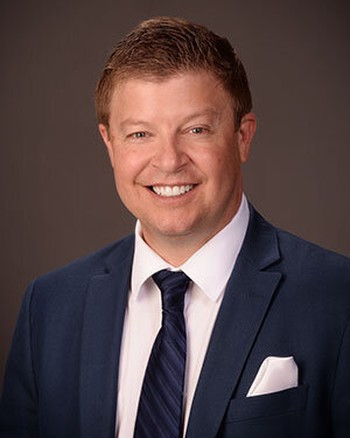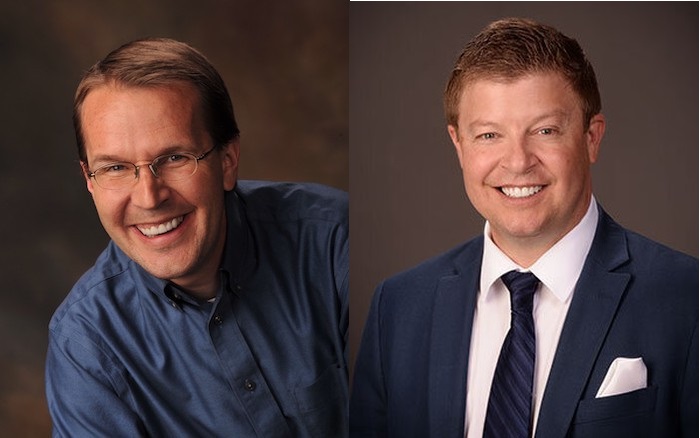CEDAR CITY — In summer of 2021, I saw Cymbeline at the Utah Shakespeare Festival’s Eileen and Allen Anes Studio theatre. Through a strange mistake, I thought someone was waving at me, but they were actually waving at someone behind me. I laughed, and then subsequently forgot this interaction for the next two years. However, Donn Jersey, director of development and communications for the Festival, not only remembered the interaction, but remembered me — whom he had never interacted with before this week, other than that incident. In my conversation with him and interim managing director with Michael Bahr, I was astounded that he remembered me from such a brief interaction. To Bahr and Jersey, however, connecting with people is just part and parcel with continuing the legacy that Fred Adams had in mind when he founded the Utah Shakespeare Festival over sixty years ago.

I attended a teacher professional development course the week of July 24 at the Utah Shakespeare Festival and had the chance to ask Bahr for an interview about how Utah Shakespeare Festival is faring in this time of uncertainty across the industry. In our wide-ranging interview, Bahr and Jersey gave me insight into what makes Utah theatre thrive in the face of economic uncertainty and what makes Utah Shakespeare Festival a uniquely strong theatre spot in the world of Shakespeare companies and in the Utah theatres scene.
Like so many who are connected to the Utah Shakespeare Festival (USF), Bahr and Jersey have been around USF for decades. Some of Jersey’s first times attending a play were in the 1980s at the festival, while Bahr spent 25 years as education director before leaving for a school admin position that lasted a short time before he was brought back to be the interim managing director.

What a time to be managing a theatre company! In December 2022, an industry bellwether signaled difficult times ahead for theatre companies as the New York Metropolitan Opera had to dip nearly $30 million into their endowment and reimagine which operas would be part of their repertoire. By April, the Mark Taper Forum — another major industry theatre company — had announced an indefinite closure. In the weeks and months since, theatre companies of all kinds and sizes have shuttered doors temporarily or permanently and caused major waves in asking “who may be next?” in the industry. I noticed this first with the closure of the Bay Area Children’s Theatre whose founder, Nina Meehan, I have interviewed on my podcast (PodcastTYA) as well as the Oregon Children’s Theatre. I was curious if USF was facing the same challenges.
The answer was a firm, yes, but with confidence to weather the storm. USF, like many theaters, has seen the increased cost of goods and labor, due to rising inflation and economic uncertainty. Some theatre companies have seen their audiences and subscribers dip precipitously as they compete with a host of post-pandemic factors that have not seen audiences return in full. This year, the festival sustained major damage to sound equipment from frozen pipes bursting that caused the planned production of West Side Story to be converted to Shakespeare’s Romeo and Juliet.

That does not mean that musicals are not in the future for USF. There are plans to get those wheels back in motion, but the profit margin for a musical is much narrower to navigate than a Shakespeare play. “We have a very good sense of where we need to be next year, and I think we’re doing a good job getting there. But that’s not where the conversation ends. Right now, we’re having important conversations about where the Utah Shakespeare Festival grows in 2030 and beyond,” says Bahr.
This week I saw four of USF’s productions including Shakespeare’s Coriolanus, Romeo and Juliet, and A Midsummer Night’s Dream, as well as the modern comedy The Play That Goes Wrong. The quality of the work is as good as it has ever been. Throughout Cedar City, I saw banners that advertised the Utah Shakespeare Festival with a single word: BELIEVE. I was curious if “BELIEVE” was a statement affirming USF’s ability to navigate such uncertain times.

“BELIEVE was actually a proposal from Donn in 2018 for the 2019 season, so its origins have little to do with what’s going on today. Rather, BELIEVE is about believing in what live theatre does,” Bahr said. “Utah Shakespeare Festival’s strengths lie in doing work based deeply in the text, in intimacy and personal connection, and in making art that inspires for education, for the good of people and the good of the community.” Jersey spoke about the importance of believing in Walter in Lorraine Hansberry’s A Raisin in the Sun, and Bahr recited the opening to Henry V where the audience is asked to believe in the action of the play with the following words:
“O for a Muse of fire, that would ascend
The brightest heaven of invention,
A kingdom for a stage, princes to act
And monarchs to behold the swelling scene!”
This is not the first storm that theaters have faced. The 2008 housing crisis, the aftermath of 9/11 and other economic downturns before that. Theatre has survived for thousands of years and is not suddenly going to disappear, even if companies across the country falter. Of note was that many of Utah’s theatre companies have been thus far remained open, despite the fates of other companies elsewhere. Bahr and Jersey were quick to note what this reflects about Utah theatregoers.

Our conversation ultimately wrapped talking about what was exciting at Utah Shakespeare festival this year. Audiences have responded overwhelmingly positively to USF’s The Play That Goes Wrong, which is the only production of the play to be done in REP with other plays (meaning one stage doing multiple plays at the same time), and uses entirely practical effects. I personally loved Romeo and Juliet and wrote glowingly of Coriolanus. The strengths of these shows — even one as farcical as The Play That Goes Wrong — all started with the philosophy that the text matters and that the moments are personal. Bahr emphasized how director Geoffrey Kent believed it was necessary to highlight the play within the play of the Play That Goes Wrong, and not allow the text to be overlooked by practical effects. I was touched by the tender deaths of Romeo and Juliet and how each character in the shows I saw not only knew what they were saying, but why and how to communicate that to the audience.
The performing arts are in a time of turmoil. From the SAG-AFTRA/Writers strike to theatres going belly up and companies competing with streaming services, it can be easy to get lost in the weeds of what’s going wrong. But my conversation with Bahr and Jersey, as well as my week spent at USF seeing their workspaces, design staff, and a cadre of capable cast and crew makes me join in with the banners flying across Cedar City. I believe in live theatre, and I believe in the Utah Shakespeare Festival.
Update: An earlier version of this article incorrectly stated that there was no musical at the Utah Shakespeare Festival this season. In fact, Emma the Musical is currently playing. We regret the error.
[box]For more information about the Utah Shakespeare Festival and its current productions, visit bard.org. To donate to the Utah Shakespeare Festival, visit bard.org/about/give.[/box]
